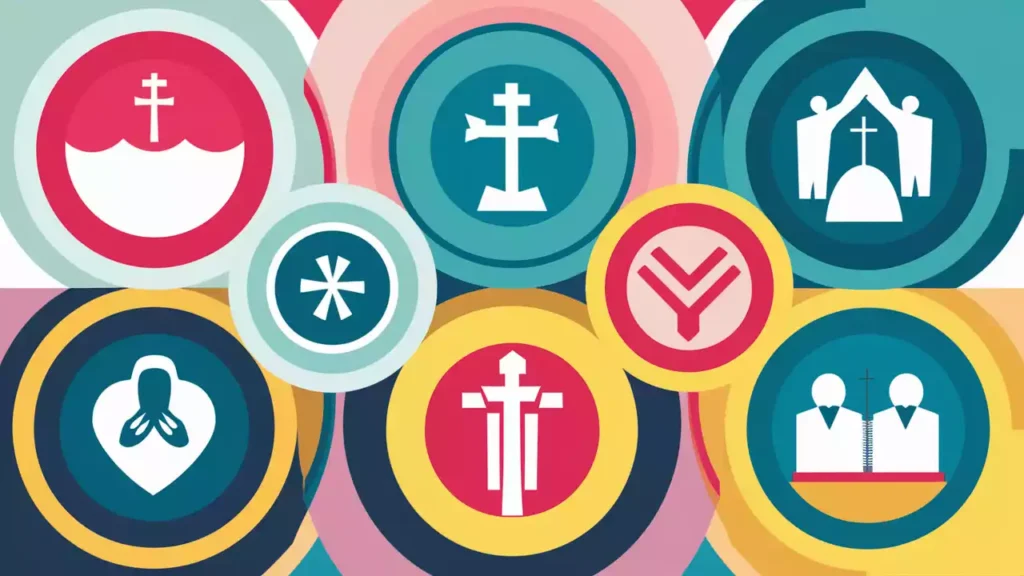Summary
- 1 Key Points
- 2 Meaning of Baptism
- 3 The Essence of Confirmation
- 4 Understanding the Eucharist
- 5 Meaning of Reconciliation
- 6 Anointing of the Sick Explained
- 7 Marriage and Holy Orders
- 8 Frequently asked questions
- 8.1 How do the sacraments affect the daily lives of Christians?
- 8.2 Can non-Christians participate in any sacraments?
- 8.3 What is the historical origin of the sacraments?
- 8.4 Are there sacraments exclusive to specific Christian denominations?
- 8.5 How do the sacraments differ in Eastern and Western Christianity?
The seven sacraments of the Christian Church - Baptism, Confirmation, Eucharist, Reconciliation, Anointing of the Sick, Wedding e Holy Orders - are essential practices intended to strengthen your faith and connection to the divine. Baptism initiates you into the Christian community, washing away sin. Confirmation deepens this bond, making your spiritual maturity stronger. The Eucharist offers continual spiritual nourishment through Christ's sacrifice. Reconciliation restores your relationship with God through confession and absolution. . Each sacrament is designed to foster a transformative encounter with the divine, enriching your spiritual journey and connection with the church community. As you explore further, more intricate details about their spiritual importance await you.
Key Points
- Each sacrament offers unique graces, strengthening believers' bond with God and the Church.
- Sacraments such as Baptism and Confirmation mark spiritual rebirth and maturity, respectively.
- The Eucharist, central to Christian worship, commemorates Christ's sacrifice and fosters unity among believers.
- Sacraments such as Reconciliation and Anointing of the Sick provide spiritual healing and renewal.
The Seven Sacraments are essential rites that symbolize spiritual stages in a Christian's life journey.
Meaning of Baptism
Baptism, the initial sacrament of initiation in Christianity, symbolically washes away the original sin, marking your formal entry into the Church. This rite, also known as 'baptism' in Italian, means the purification of the soul and is considered the foundation of a Christian life. Within the various denominations, the method of the baptism can vary, ranging from immersion, where one is completely submerged in water, to sprinkling, where water is poured over the head. Each tradition emphasizes the importance of this sacramental act not only as a ritual purification but as a profound spiritual rebirth.
Scholars often point out that through baptism one is admitted into the Christian community and you become part of the body of Christ. It is a covenant, a solemn promise between you and God, mediated by the Church. Theological foundations suggest that baptism is not simply a form of external purification but also initiates an internal transformation, enabling you to participate in the divine life.
Understanding the multifaceted role of baptism is essential. It is not just a ceremonial entry into the Christianity but a deep ongoing commitment to live by the values and Christian teachings. By embracing baptism, you begin a lifelong journey of faith, guided by the principles of love, forgiveness and service encapsulated in the Christian doctrine.

The Essence of Confirmation
After baptism, confirmation serves as a spiritual deepening within the Church, further solidifying your commitment to the Christian faith and community. This sacrament, known as confirmation in Italian, marks a milestone in your spiritual journey. It is not just a ritual, but a deep affirmation of faith and an acceptance of responsibility within the community.
Confirmation is rich in symbolism and meaning, emphasizing the growth and maturity of your faith. Here is a detailed analysis of what this sacrament represents:
- Reinforcement of the Holy Spirit: Receive a special outpouring of the Holy Spirit, which began at your baptism, strengthening your spiritual resolve.
- Deepening Personal Faith: It requires a personal commitment in which you confirm the beliefs stated during baptism, now with a deeper understanding.
- Connecting with the Community: Confirmation strengthens your bond with the church community, signifying your active participation and responsibility in it.
- Spiritual Maturity: This sacrament is often associated with reaching a mature stage in your spiritual and personal development.
- Rite of Passage: It serves as a pivotal moment, marking the transition from childhood faith to a more mature personal conviction.
Through confirmation, you are not just following a tradition; you are embracing a higher calling both in faith and in life.
Understanding the Eucharist
The Eucharist, often called Communion, embodies a central and transformative sacrament within Christian worship, symbolizing both the sacrifice and the ongoing presence of Christ in the believer's life. When you participate in the Eucharist, you are not simply consuming bread and wine; you are performing a profound act of faith and remembrance. This sacrament has deep roots in the Last Supper, where Jesus established a new covenant through His body and blood, urging His followers to continue this tradition.
To fully understand the multifaceted nature of this sacrament, consider its key elements:
| Element | Meaning |
|---|---|
| Bread and Wine | Symbols of the body and blood of Christ |
| Consecration | The priestly blessing that invokes the presence of Jesus |
| Communion | The act of receiving and uniting with Christ spiritually |
Understanding the Eucharist, o eucharist, involves recognizing its dual role in the Christian life: it is both a memorial of Christ's sacrifice and a celebration of His eternal presence. As you participate, you are believed to be not only reminded of Jesus' suffering and resurrection, but also spiritually nourished and renewed, deepening your connection with the divine and the community of believers.
Meaning of Reconciliation
While the Eucharist focuses on communal unity through Christ's sacrifice, Reconciliation emphasizes personal renewal and confession as fundamental to spiritual growth. In the Sacrament of Reconciliation, one has the opportunity to deal with personal sins and experience divine forgiveness, which is essential for maintaining a healthy spiritual life.
Here are some key elements of Reconciliation that underscore its importance:
- Personal Confession: Openly admit your sins to a priest, promoting a deep sense of personal responsibility and humility.
- Absolution of the Priest: Symbolizing God's forgiveness, the priest absolves you, helping to restore your relationship with God.
- Deed of Contrition: Express sincere repentance for your sins, which is essential for genuine spiritual renewal.
- Repentance: Performing acts of penance shows your commitment to amend your life and avoid future sins.
- Grace of Reconciliation: This sacrament provides special grace that strengthens you against sin and contributes to spiritual healing.
Addressing the complexities of the reconciliation, you are not just seeking forgiveness; you are working toward a transformation that aligns more closely with Christian teachings and values. This sacrament is a pillar for personal development and spiritual maturity.
Anointing of the Sick Explained
The Anointing of the Sick, often misunderstood, is a sacrament which provides spiritual comfort e physical strength during illness. Exploring its meaning further, you will find that theanointing of the sick not only serves as spiritual consolation, but is also an integral part of the pastoral care of the Church for believers facing serious health challenges.
The sacrament involves the anointing of the forehead and hands with blessed oil by a priest, accompanied by prayers for healing. It is important to recognize that this is not only a ritual for those at the end of life, but is also intended for those who are seriously ill, are undergoing major surgery or are elderly and weakened. The sacrament offers grace for spiritual strength to endure suffering with patience and faith.
Through this sacrament, the Church affirms the value of human life in all its stages and conditions. We encourage you to see it as an opportunity for the Lord to grant spiritual healing And, if it is in His will, physical healing. The anointing of the sick emphasizes the compassionate nature of the Church, ensuring that no one is spiritually alone in the time of illness.
Marriage and Holy Orders
Investigating Marriage and Holy Orders reveals how these sacraments structure Christian community and personal life. The sacrament of *marriage* is not just a personal commitment; it is a profound vocation that echoes Christ's unconditional love for the Church. This sacrament blesses the union of a couple, Giving them the strength to uphold Christian values in a family context, promoting faithfulness and nurturing life.
In contrast, Holy Orders consecrates individuals to lead the Christian community. This sacrament is fundamental in that it ordains men to the diaconate, priesthood or episcopate, entrusting them with responsibilities such as teaching, sanctifying and governing.
Here are some key aspects to contemplate:
- The Wedding invites couples to participate in God's creative work, emphasizing procreation and raising children in faith.
- Holy Orders marks a commitment to service, requiring a life dedicated to the spiritual needs of others.
- Both sacraments are public declarations of a lifelong commitment, either to another person or to the Church.
- They serve as channels of grace, helping individuals live out their vows through divine assistance.
- Each sacrament has its own rites and rituals, deeply rooted in symbolic actions and sacred words, reinforcing their sacramental nature.
Together, these sacraments enrich the Christian community by nourishing family life and leadership within the church.
Frequently asked questions
How do the sacraments affect the daily lives of Christians?
The sacraments deeply influence your daily Christian life by offering grace, guiding moral decisions and strengthening your faith through ritual acts that connect you to the larger community and the divine.
Can non-Christians participate in any sacraments?
As you explore the waters of sacramental participation, you will find that non-Christians generally cannot participate in sacraments such as Communion or Baptism because these rites presuppose a fundamental belief in and commitment to the Christian faith and to the teachings.
What is the historical origin of the sacraments?
Sacraments originated from practices instituted by Jesus and early Christians, evolving through theological developments and church councils to formalize rites signifying grace, including baptism and Eucharist, central to Christian spiritual life.
Are there sacraments exclusive to specific Christian denominations?
Yes, you will find that certain sacraments are exclusive to specific denominations. For example, Anointing of the Sick is primarily a Catholic practice, not commonly observed in Protestant churches.
How do the sacraments differ in Eastern and Western Christianity?
In Eastern Christianity you will find a more mystical approach to the sacraments, emphasizing transformation, while Western traditions often focus on legalistic aspects, such as remission of sin. This shapes their liturgical and theological expressions differently.
